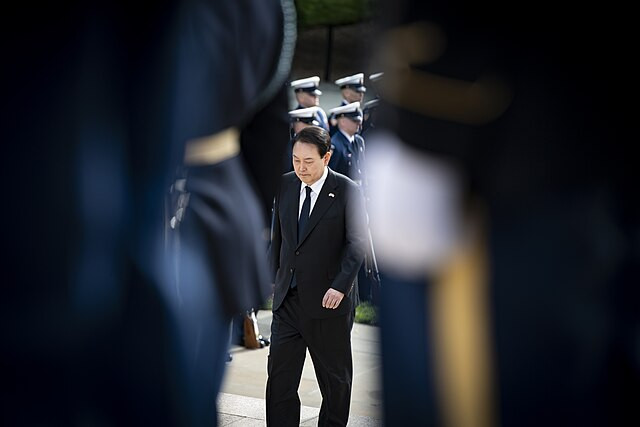South Korean President Yoon Suk Yeol lifted his declaration of martial law early Wednesday following an intense standoff with parliament and widespread public protests. The controversial move, which lasted only six hours, brought immediate backlash from lawmakers and citizens, further deepening the political crisis engulfing the nation.
Late Tuesday, Yoon stunned the country by declaring martial law, accusing the opposition-controlled parliament of enabling "pro-North Korean forces" and threatening the constitutional order. During a televised address, Yoon said he would "eradicate anti-state forces and protect the constitutional democratic order." He also urged citizens to endure "some inconveniences" to stabilize the nation.
The National Assembly, dominated by the opposition Democratic Party, acted swiftly. Speaker Woo Won-shik declared the martial law "null and void" after a unanimous vote by 190 lawmakers present. Woo said that Lawmakers "will protect democracy with the people." The vote triggered the immediate withdrawal of police and military forces from the Assembly grounds.
Protests erupted outside the National Assembly, with demonstrators waving banners and demanding Yoon's resignation. A chaotic scene unfolded as scuffles broke out between protesters and police. One protester attempted to disarm a soldier while shouting, "Aren't you embarrassed!" Television footage showed troops stationed outside the parliament and helicopters circling overhead, adding to the tension.
Yoon's cabinet approved a motion to lift martial law early Wednesday morning. The measure was formally terminated at 4:30 a.m. local time, Yonhap News Agency reported. Military personnel left the Assembly grounds shortly thereafter, ending the most dramatic use of martial law in South Korea since the nation's democratization in 1987.
The Biden administration expressed concern over the developments in Seoul. "We are seriously concerned by the developments we are seeing on the ground in the ROK," a National Security Council spokesperson said. President Joe Biden, traveling in Angola, was briefed on the situation. Meanwhile, Pentagon officials confirmed that the 28,500 U.S. troops stationed in South Korea were unaffected. "We have every hope and expectation that any political disputes will be resolved peacefully," said U.S. Deputy Secretary of State Kurt Campbell.
The declaration of martial law marked a critical moment in Yoon's troubled presidency. Since taking office in 2022, Yoon has faced mounting opposition from a parliament controlled by his political rivals. The Democratic Party has accused his administration of corruption and authoritarian tendencies, while Yoon has criticized lawmakers for undermining his government through legislative and budgetary maneuvers. During his martial law declaration, Yoon described the opposition's actions as "unscrupulous acts of legislative and budgetary manipulation that are paralyzing the functions of the state."
Opposition leader Lee Jae-myung, who narrowly lost to Yoon in the 2022 presidential election, called the martial law declaration "illegal and unconstitutional." Democratic Party lawmakers vowed to remain in the Assembly hall until Yoon officially rescinded the order. Lee warned that the president's actions had crossed a dangerous line and signaled the party's readiness to pursue impeachment if Yoon did not resign within 72 hours.
Under South Korean law, impeachment requires a two-thirds vote in parliament and approval by the Constitutional Court. If the court upholds the motion, Yoon would be suspended, and elections would be held within 60 days. Prime Minister Han Duck-soo would serve as interim leader during the process.
Yoon's declaration also drew criticism from within his own conservative People Power Party. Party leader Han Dong-hoon called the move "wrong" and pledged to work alongside the people to restore political order. Yoon's approval ratings, already low, have taken another hit as the crisis continues to unfold.






